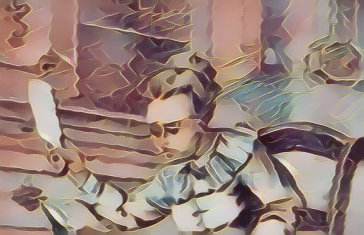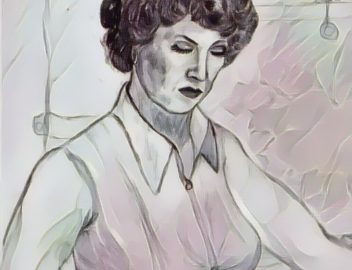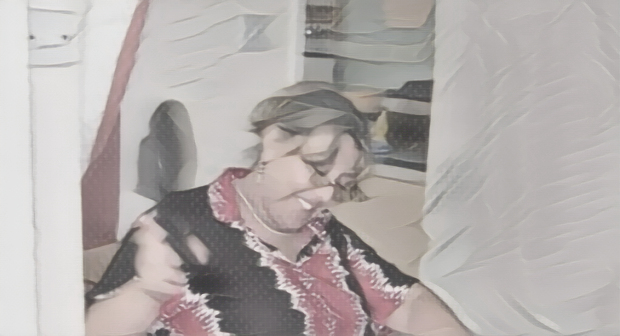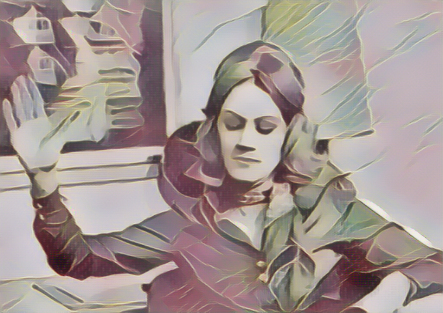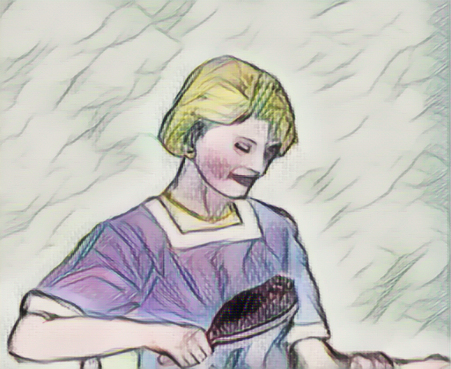The cellar was barely big enough for the three of us, its low ceiling forcing us to hunch as we crept inside. The air was thick and musty, heavy with the scent of damp earth and old wood. Dim light filtered through a tiny, grimy window, casting long shadows over the cracked concrete floor. Cobwebs clung to the corners, and shelves lined with dusty jars and forgotten tools loomed over us. An old, rusty bicycle leaned against the wall, and the cold stone sent a chill through our bare feet. A stack of Beano comics and a jump rope sat forgotten in the corner, relics of afternoons past. Every sound seemed to echo in the close, shadowy space, making us feel both hidden and exposed at the same time.
Being in such an enclosed space, and with the other two being a few years older, some form of disagreement took place. I was at an age where I had just learnt some swear words—picked up from older kids on the street or maybe from a cheeky line in a Beatles song. I thought it would be very clever to direct a few of them at my sister Jennifer and Carol. My sister, who was always the innocent party, never got involved in this type of thing. Carol, on the other hand, did.
Out of nowhere, the kitchen door creaked open and Mrs. Walker—Carol’s mum—started making her way down the steps. She was a tall, broad-shouldered woman with a no-nonsense posture, her back ramrod straight and her chin set with determination. Her face was stern, lips pressed into a thin line, and her eyes sharp and unblinking as she scanned the cellar. Each step she took was deliberate and heavy, her sensible shoes thudding on the wooden stairs, making it clear she was in complete control of the situation. The air seemed to tighten around us as she entered, her presence filling the cramped space with authority and a hint of menace. The faint sound of the radio upstairs faded, replaced by the unmistakable tension of a grown-up in charge—a feeling every 1970s kid knew well.
She found me standing there, cheeks burning with embarrassment, while Jennifer and Carol looked as if butter wouldn’t melt in their mouths, shooting me disapproving looks. My vest and underpants were the kind every kid wore back then—plain, practical, and a little too big, handed down from an older cousin.
Mrs. Walker demanded to know who had been swearing. Jennifer and Carol, both a few years older and clearly wanting me out of their way, wasted no time snitching on me. They pointed at me with a kind of eager relief, spinning a story that made it sound like I was the only troublemaker. It was obvious they didn’t want the little one tagging along, and this was their chance to get rid of me. Their actions felt deliberate, almost rehearsed, as if they’d been waiting for an excuse to exclude me. Mrs. Walker believed them instantly, her temper flaring. In those days, adults didn’t hesitate to dole out discipline, and nobody questioned it.
She grabbed my arm and gave me a rough shake, then she started smacking the backs of my legs. I tried to dodge her in the tiny cellar, but there was nowhere to go. The shock of her touch was different from anything I’d felt before—her grip was unfamiliar, her anger not softened by the love I knew from my own mother. It was as if a wall had gone up between us, and I was suddenly a stranger in a place I thought was safe. In the 1970s, a smack was just part of growing up, and nobody thought twice about it.
She hauled me over to the couch, sat down, and yanked me across her lap. Out of nowhere she produced a flat wooden thing that I was to find out later was a paddle. It was broad and heavy, the wood smooth but cold against my skin, and the edges slightly worn from use. I remember the way she gripped it tightly, her knuckles white, and how the paddle caught the dim cellar light, making it look even more menacing. (short pause) The first smack landed with a sharp, echoing crack that seemed to fill the entire cellar. The sound was startling—loud, almost explosive, bouncing off the stone walls and making my heart race. Each strike that followed was just as fierce, the paddle slapping down with a sting that burned and throbbed, the pain blooming instantly and spreading across my skin. But what hurt even more was the realization that this punishment was coming from someone who wasn’t my mother. There was no comfort in her voice, no familiar rhythm to her anger—just a cold, impersonal discipline that made me feel small and utterly alone. (pause) The confusion was overwhelming. I didn’t know whether to be angry, ashamed, or just scared. The embarrassment was sharper than the pain, my cheeks burning as I realized how exposed I was, not just physically but emotionally. I could feel the rough grain of the wood through the thin fabric of my vest, and with every blow, the ache deepened, making my legs kick and my hands clench the couch in desperation. The cellar felt even smaller, the air thick with the smell of dust and fear, and the only sounds were my own cries and the relentless rhythm of the paddle. My cheeks were hot with humiliation, tears streaming down my face, and I could sense Jennifer and Carol watching, their eyes fixed on me, feeding my shame. The punishment seemed to go on forever, each smack a reminder of my helplessness, the pain and embarrassment mixing until I felt completely exposed and alone. Even after the last blow, the sting lingered, and the memory of that paddle—its weight, its sound, the way it made me feel—would stay with me for years. In those days, nobody talked about feelings or questioned a neighbor’s authority; you just took your lumps and tried not to cry too loudly.
I howled, kicking and sobbing, and by the time she was done, I was a wreck—my face streaked with tears and my backside burning. The humiliation was almost worse than the pain, and the echo of that paddle haunted me long after I left the cellar. But what lingered most was the sense of alienation, the deep discomfort of being punished by someone who didn’t love me, who didn’t know me the way my mother did. It was a different kind of hurt—a cold, impersonal sting that left me feeling like an outsider, even in a place I thought was familiar. In the 1970s, you learned quickly that adults stuck together, and kids were expected to fall in line.
What made it even worse was the way Jennifer and Carol watched the whole thing unfold. I could see the satisfaction on their faces—Jennifer looked smug, and Carol’s eyes sparkled with a kind of gleeful excitement. They didn’t look away or seem sorry for me; if anything, they seemed to enjoy seeing me get punished. Their enjoyment made the whole experience even more humiliating and isolating, as if I was completely alone in my shame and pain. That was the way of things back then—siblings and friends could be your worst enemies, especially when there was nothing else to do but stir up trouble.
I limped home, sore and subdued, but secretly relieved that my mother would never know. That day taught me a lot about dares, consequences, and the unpredictable ways grown-ups handed out discipline in the 1970s. (pause) Childhood is full of moments like that—painful, embarrassing, and impossible to forget, especially when the lesson comes from someone who isn’t family, leaving a mark that’s as much emotional as it is physical. Even now, the sound of a distant radio playing an old pop song or the sight of a rusty bike can take me right back to that summer, when the world was smaller, the rules were stricter, and childhood felt both safer and scarier all at once.
